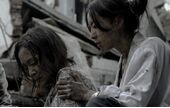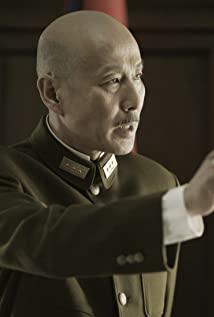Director: Feng Xiaogang
Cast: Xu Fan, Chen Daoming, Zhang Jingchu, Li Chen
Genre: Plot
Duration: 130 minutes
Production: Huayi Brothers
"23 seconds, 32 years", the biggest publicity stunt of "Tangshan Earthquake". These two "69-style" interlaced Arabic numerals imply the narrative structure of the entire film. As a result, the keywords "innuendo" and "narrative structure" have become the key to the interpretation of this movie.
First of all, we must talk about the lens of "Tangshan". To put it meaningfully, "Tangshan" is basically the visual dimension of a TV series. First, almost all the plots take place in the frame, and the six-dimensional outer space of the film is not involved at all. Second, there are too many conversations. According to Sid Field, actions are roles, and a character's actions—not his words—determine his role. Third, "Tangshan" does not reprocess reality artistically. The various scenic spots in Hangzhou are photographed from above, which feels like a tourist promotion film. However, Feng still added some film-specific techniques to "Tangshan". For example: Fang Deng's nightmare. A static space (standing Fang Deng) and a dynamic space (cycling with mom and brother's father) are interlaced between color film and black and white film. Another example: Fang Deng and his adoptive father met again many years later. The dialogue between the two was basically carried out on continuous reeling.
It all started when the
lights of the memorial service dimmed, and the movie opened in the names of the victims who gradually disappeared like stars in the sky. "23 seconds" before, nothing to say. Digital special effects that are solid to the flesh, IMAX friends, should be very cool. As soon as it came up, Feng put a cruel realism sketch on the whole film, but unfortunately, after "32 years", the description became more and more absurd. Regarding the later "32 years", we have to start with the scene of Mao's memorial service.
We might as well ask ourselves, why does Feng want to shoot Mao's memorial service? According to common sense, any plot appearing in the film should have a function of promoting or anti-establishment to the entire narrative. Feng Paimao's memorial service should be a reflection of a political earthquake. Feng Xiaogang said: "This is the same as the fate of Li Yuanni's family in the movie. The Tangshan earthquake brought misfortune. No matter how painful and nostalgic the departure of your loved ones, you still have to move forward. After the Tangshan earthquake, Soon after Mao Zedong died, Hua Guofeng took over, and soon Deng Xiaoping came back, China's Cultural Revolution stopped, reform and opening up, China bid farewell to the past, and ushered in a new life." In this way, the film entered the next "32 years" grandiosely.
Because the narrative structure of the latter "32 years" is lazy, just like the ideological transition from collectivism to individualism. Roughly speaking, the film appeared in four time nodes: 1986, 1989, 1995, and 2008. In 1986, Deng grew up suddenly, and a girl with autism suddenly covered her face with sunshine. In 1989, I was admitted to the university and got involved with the seniors, saying "you don't understand", resolutely dropped out of school and gave birth out of wedlock. In 1995, Da started BMW somehow, insisting on buying a commercial house for his mother that was still building a new building. In 2008, there was an earthquake in Wenchuan, and Deng and Daxin knew each other eloquently. Deng returned home and the mother and daughter were reunited and crying.
For the above four stages, Feng used a lot of omissions to splice. As a result, it was obvious that the four movies could be shot separately, and it turned into a plate of salt, pepper, sweet and sour rice topped. On this one side, Deng is still teaching English, and stubbornly refuses to get the honorarium; on the other side, Deng is already married to a 16-year-old ghost. On this end, Da is still on a mission to visit Hangzhou in three rounds; on the other end, Da has turned into the boss of a travel company and taught his subordinates-"Small earthquakes don't have to escape the big earthquakes." Looking at it this way, "Tangshan" is a thousand miles away from "A World Without Thieves".
"Impression of Patriarchy" & "Male Rootism"
All the metaphors took place in 1989, which was the third summer vacation that connected the two summer vacations and did not return home. Boarded in the "Summer of 89", pregnant. After learning that his daughter had been fucked by "waste", Chen Daoming in a military uniform gave Lu Yi a slap in the face after taking off the uniform. Later, Lu Yi went into exile abroad, and there was no news. Stanley Cavill said, “The soldiers represent uniformed people. That is to say, they are people doing secular work. The imprint of his own situation. This kind of character embodies the myth of the group that society is the natural state of man." At this time, Chen Daoming turned into a "patriarchal impression" who took off his uniform (stepped off the altar) and used force against the students.
Feng once said, "I am a director who really put the words Chairman Mao's words'serving the people' and'literary art for the workers, peasants and soldiers' into practice." Obviously, he was in "Tangshan". "I thoroughly implemented my worship. We can see that what Feng gave to a uniform army was "Heroes". In the two earthquakes, both the army leveled the reinforced concrete that was stalking human flesh.
Mark Filo pointed out in "Is there a history of film perspective?", "The perspective of ideology tends to replace the perspective of academic and positivism. In a society where ideology is in command, this perspective will inevitably win." Mao's memorial service in "Tangshan", with large groups of caps, it is not difficult to see the silence of this kind of perspective. Of course, "Tangshan" embodies more of a kind of positivism in appearance. The red flag fans in the 1970s, the white elephant battery in the 1980s, the Spring Festival Gala in 1995, and the oversized basketball shoes worn on the feet are all marks of the times. A large number of props density basically fulfilled the role of mapping history well. The only historical perspective that has not changed is probably the hidden answer of why the mother saves the younger brother but not the older sister-male rootism.
Speaking of props, Mao's portrait and Deng's portrait are really worth mentioning. In the entire Tangshan ruins, only two eye-catching "Long live" have not been shaken down. Only, every household still hangs huge portraits of Mao in their newly built homes. We can notice that all the portraits of Mao that appear are basically frontal shots or high-key lighting. The portrait of Deng appeared only once in the entire film. Cum: It is the first time for Deng and his adoptive father to celebrate the New Year at home. The adoptive father received a phone call from his comrades and said apologize and apologize on the phone. A portrait of Deng (Deng Xiaoping's military parade in 1984) hung in the corner where he answered the phone. Only that corner of the room was the darkest. If it is true that Feng used prop density to map history. So, why does this portrait of Deng appear in this dark corner? Since you have filmed Mao's memorial service, why not film Deng's? In order to show the love between the two men, Wong Kar-wai also played a small amount in "Happy Together". What's more, did the "pain of the Fang family" depicted in "Tangshan" really all come from the 23-second earthquake? Feng Xiaogang said: "Earthquakes are natural disasters, but our history is not only part of natural disasters, but also other factors."
Finally, the film pans from a metaphysical white cloud to a metaphysical "traumatic person" (survivors of the Tangshan earthquake) By). Feng, with a Chinese person’s unique self-comfort-"Sorrow and change", in response to the film's most hoarse stress-"God, you bastard!"
Note: The star that is more than the second brother gave those Group performance of selfless dew point.
View more about Aftershock reviews











